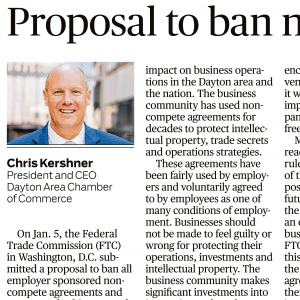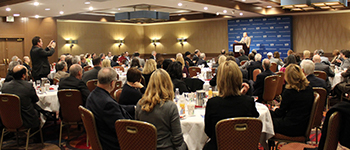Kershner: Proposal to ban noncompete agreements illegal, out of line
VIEW ARTICLE AS FEATURED IN DAYTON DAILY NEWS
 On Jan. 5, the Federal Trade Commission (FTC) in Washington, D.C. submitted a proposal to ban all employer sponsored noncompete agreements and January 18th, this proposal was officially registered on the U.S. Federal Register.
On Jan. 5, the Federal Trade Commission (FTC) in Washington, D.C. submitted a proposal to ban all employer sponsored noncompete agreements and January 18th, this proposal was officially registered on the U.S. Federal Register.
This issue has exposed two major flaws in the perceived role of the FTC. 1) A ban on noncompete agreements by the FTC would stifle innovation, put intellectual property at risk and would be detrimental to business operations. 2) This action is illegal and the FTC does not have this competition rulemaking authority to implement this rule.
This blanket proposal by the FTC is out of line and would have a devastating impact on business operations in the Dayton area and the nation. The business community has used noncompete agreements for decades to protect intellectual property, trade secrets and operations strategies.
These agreements have been fairly used by employers and voluntarily agreed to by employees as one of many conditions of employment. Businesses should not be made to feel guilty or wrong for protecting their operations, investments and intellectual property. The business community makes significant investments into innovation and product creation; they must have confidence that their proprietary information will be kept confidential. If we lose this ability, the impact to fair market competition and business operations will be beyond imagination.
Dayton area businesses have paved the way for innovation and creativity since the turn of the 20th century and this culture is still thriving today. This innovative culture has been a result of a supportive local ecosystem and government policies that encourage these risk-taking ventures. If this rule passes it will have a significant and adverse impact on Dayton area companies that must have this freedom to be successful.
Moreover, the FTC overreach with this proposed rule is illegal. Proponents of this noncompete proposal would also like to see future rulemaking action by the FTC which could have an even greater impact on business operations. The FTC most certainly expects this rule to be challenged in the courts, and if the court agrees with them, then there will be future authority given for this absurd overreach to continue.
Bottom line: The FTC does not have this rulemaking authority and if the proponents want to legally have this issue considered, then that is why we have a bipartisan Congress with the authority and the process to review and debate the issue.
Business won’t be the guinea pig for government overreach.
Chris Kershner, CAE
President & CEO
Dayton Area Chamber of Commerce








